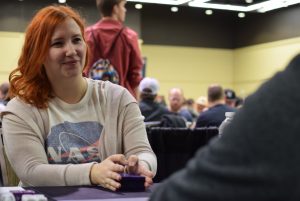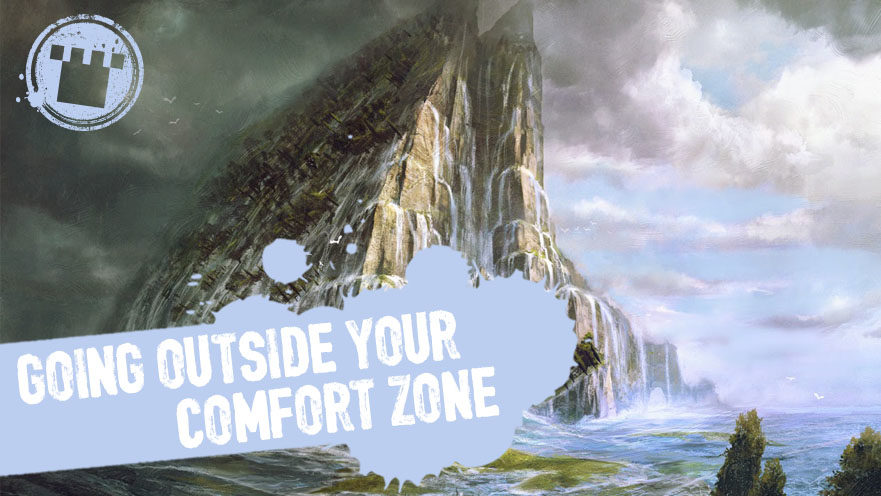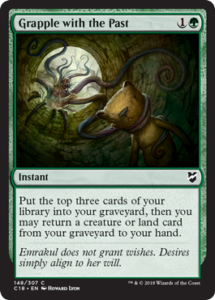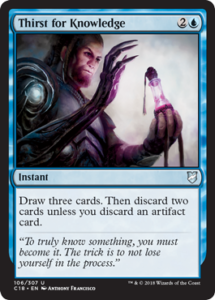Winning isn’t the same thing as getting better. In fact, sometimes they might be diametrically opposed.
“But Chantelle,” you may ask, “how do I know if I’m getting better if I’m not winning?”
I think this is best answered by an anecdote – one about me as a young planeswalker (and by “young” I mean “just a few short months ago”), choosing to sleeve up Grishoalbrand instead of the more popular (and more interactive) Humans deck for a local tournament. Did I Top 8 that tournament? Yes. Did I get any better at Magic? …probably not.
Getting better involves one of my favorite things: introspection. It also involves one of my less-than-favorite things: hard work. It takes a lot of self-awareness to recognize your shortcomings, but it takes even more dedication to take the first step down a path to shoring them up.
It’s very easy to make excuses – too busy, too much else going on, not important. I had a friend call me out on all of these when I lamented my inability to hold my own in a draft. It had never been the right time to focus on limited, with Standard PPTQ season or a Legacy Grand Prix or a Modern RPTQ always right around the corner. But excuses only get you so far, and after a while, you either have to live with it or change – and I’ve never been the type of person to accept mediocrity.
I’ve also never been the type of person to do anything without being fully committed, and with that, #100DaysOfDraft was born. A draft a day. For 100 days. I’m currently on day 28, and feeling like I’ve learned more about draft in the last 28 days than I’d learned in my past 5 years playing Magic. But I haven’t quite learned how to be good at it… yet.
It’s called your comfort zone for a reason: it’s where you live day-in and day-out. Where you feel at ease. But stepping outside of it and into unknown waters can be beneficial in ways that you might not have even considered. For instance, when I wrote my first tournament report after Grand Prix Vancouver for a small Canadian card shop, I couldn’t imagine that this would lead me down a path where I would find myself writing for a company like Card Kingdom. And when I first began pursuing Magic more competitively, I could never have predicted how many friendships I would gain because of my love for this game. I’m not saying that you should quit your job to go after your dream of being a professional Magic player without having won a PPTQ, but having a plan in mind for your goals, recognizing the steps you need to take to reach them, and being willing to step outside – sometimes way outside – your comfort zone is key.
But, like playing Humans for the first time and learning how to draft, winning doesn’t always come quickly – or particularly easily. Going through the motions won’t necessarily make you better at the skill that you’re trying to improve. In fact, setting aside time to reflect and learn is just as important as taking that initial step. For instance I’ve been reviewing my draft picks and analyzing videos of my matches. Depending on the skill that you’re looking to cultivate or the goal that you’re trying to achieve, simply repeating the same action over and over without reviewing what is going well and what is going poorly could be just as futile as not wanting to move forward at all.
I find that it’s also important to plan or set smaller goals based on that reflection. For example, in my drafts in the past I shied away from blue cards and more controlling decks. After a particularly poor performance with a blue-based deck, I replayed my games in my head and determined that, while I made no obvious misplays, all of the games I had played were winnable, and a repeated loss of small edges had cost me my matches. After that, I was determined to be more thoughtful in my decision-making and am working on not making decisions on “auto-pilot.”
A final tip I’ll leave you with is this: don’t be too proud to ask for help. One of the best ways to learn is from people who are better than you. That’s one of the reasons I’ve been so public in my quest to improve. Having friends make suggestions and provide feedback on draft decks, and being able to talk out plays and get other perspectives has been such a boon.
Whatever your goals, I hope you’re not afraid to work to achieve them. By breaking your goal up into smaller, more easily attainable steps, identifying the areas you can improve, working your butt off and learning as you go, those goals that initially seemed unattainable may be within reach. If draft is your downfall, feel free to join me in #100DaysOfDraft! Or play that deck you’ve always been scared of piloting, or write that article or start that podcast. Put yourself out there, and while it will be hard, it might just be the most rewarding thing you do.

A Spike at heart, Chantelle spends her free time prepping for tournaments, working toward the ever-elusive Mythic Championship, and championing other competitive ladies. She’s a combo aficionado and seasoned aggro deck player, and Standard and Modern are her preferred formats. Growing and improving as a player, both technically and in her mental game, are of the utmost importance to her.



